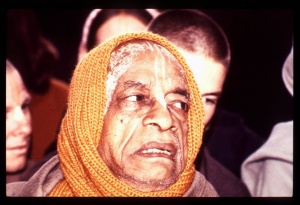CC Madhya 19.215: Difference between revisions
m (1 revision(s)) |
No edit summary |
||
| Line 1: | Line 1: | ||
{{ | [[Category:Sri Caitanya-caritamrta - Madhya-lila Chapter 19|C215]] | ||
<div style="float:left">'''[[Sri Caitanya-caritamrta|Śrī Caitanya-caritāmṛta]] - [[CC Madhya|Madhya-līlā]] - [[CC Madhya 19|Chapter 19: Lord Śrī Caitanya Mahāprabhu Instructs Śrīla Rūpa Gosvāmī]]'''</div> | |||
<div style="float:right">[[File:Go-previous.png|link=CC Madhya 19.214|Madhya-līlā 19.214]] '''[[CC Madhya 19.214|Madhya-līlā 19.214]] - [[CC Madhya 19.216|Madhya-līlā 19.216]]''' [[File:Go-next.png|link=CC Madhya 19.216|Madhya-līlā 19.216]]</div> | |||
{{CompareVersions|CC|Madhya 19.215|CC 1975|CC 1996}} | |||
{{RandomImage}} | |||
==== TEXT 215 ==== | ==== TEXT 215 ==== | ||
<div | <div class="verse"> | ||
svarga, mokṣa kṛṣṇa-bhakta ‘naraka’ kari’ māne | :svarga, mokṣa kṛṣṇa-bhakta ‘naraka’ kari’ māne | ||
kṛṣṇa-niṣṭhā, tṛṣṇā-tyāga—śāntera ‘dui’ guṇe | :kṛṣṇa-niṣṭhā, tṛṣṇā-tyāga—śāntera ‘dui’ guṇe | ||
</div> | </div> | ||
| Line 12: | Line 16: | ||
==== SYNONYMS ==== | ==== SYNONYMS ==== | ||
<div | <div class="synonyms"> | ||
''svarga''—the heavenly kingdom; ''mokṣa''—liberation from material bondage; ''kṛṣṇa-bhakta''—a devotee of Lord Kṛṣṇa; ''naraka kari’ māne''—considers as good as hell; ''kṛṣṇa-niṣṭhā''—being fixed at the lotus feet of Kṛṣṇa; ''tṛṣṇā-tyāga''—giving up all material desires; ''śāntera''—of one on the neutrality platform; ''dui guṇe''—two transcendental qualities. | |||
</div> | </div> | ||
| Line 19: | Line 23: | ||
==== TRANSLATION ==== | ==== TRANSLATION ==== | ||
<div | <div class="translation"> | ||
“When a devotee is situated on the platform of śānta-rasa, he desires neither elevation to the heavenly planets nor liberation. These are the results of karma and jñāna, and the devotee considers them no better than hell. A person situated on the śānta-rasa platform manifests the two transcendental qualities of detachment from all material desires and full attachment to Kṛṣṇa. | “When a devotee is situated on the platform of śānta-rasa, he desires neither elevation to the heavenly planets nor liberation. These are the results of karma and jñāna, and the devotee considers them no better than hell. A person situated on the śānta-rasa platform manifests the two transcendental qualities of detachment from all material desires and full attachment to Kṛṣṇa. | ||
</div> | </div> | ||
__NOTOC__ | |||
<div style="float:right; clear:both;">[[File:Go-previous.png|link=CC Madhya 19.214|Madhya-līlā 19.214]] '''[[CC Madhya 19.214|Madhya-līlā 19.214]] - [[CC Madhya 19.216|Madhya-līlā 19.216]]''' [[File:Go-next.png|link=CC Madhya 19.216|Madhya-līlā 19.216]]</div> | |||
__NOTOC__ | |||
__NOEDITSECTION__ | |||
Revision as of 03:42, 4 September 2021

A.C. Bhaktivedanta Swami Prabhupada
TEXT 215
- svarga, mokṣa kṛṣṇa-bhakta ‘naraka’ kari’ māne
- kṛṣṇa-niṣṭhā, tṛṣṇā-tyāga—śāntera ‘dui’ guṇe
SYNONYMS
svarga—the heavenly kingdom; mokṣa—liberation from material bondage; kṛṣṇa-bhakta—a devotee of Lord Kṛṣṇa; naraka kari’ māne—considers as good as hell; kṛṣṇa-niṣṭhā—being fixed at the lotus feet of Kṛṣṇa; tṛṣṇā-tyāga—giving up all material desires; śāntera—of one on the neutrality platform; dui guṇe—two transcendental qualities.
TRANSLATION
“When a devotee is situated on the platform of śānta-rasa, he desires neither elevation to the heavenly planets nor liberation. These are the results of karma and jñāna, and the devotee considers them no better than hell. A person situated on the śānta-rasa platform manifests the two transcendental qualities of detachment from all material desires and full attachment to Kṛṣṇa.